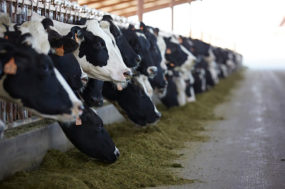Farmers have a vested interest in treating their animals right and are taking advantage of the many options to enhance animal care and comfort on their farms. Activists, however, tell a different story.
So what’s the deal?
The issue is raised at a growing number of farm conferences as groups are taking the bull by the horns and discussing the issue, advising farmers to be proactive in talking, showing and explaining farm practices.
Here are a few reasons why farmers’ participation in conversations around us is important.
1. Farmers should be defining and explaining what farmers do – not “anti-agriculture” groups.
2. Farmers know why certain farm practices exist and are receptive to innovation for continued improvements.
3. Farmers are among the most trusted professionals in Canada. Farmers also genuinely trust others. The common tactic of going undercover on “large” farms and portraying them as businesses focused only on profit is used to create mistrust among consumers.
4. If farmers don’t speak up, they leave the space to others to do so.
Farmers have strong values
For farmers, owning the issue of animal care and driving progress is important. After all, farmers are the real experts, the ones taking care of animals day in and day out.
Farms today have great environmental records because of their strong commitment to sustainable farming. Farmers have applied years of research to improve animal care.
Have you evaluated your farm practices recently? Would you be ready to explain what you do on a local or national TV news show?
Here are a few questions to help prepare you for questions about animal care on your farm:
- When you hire new employees, do you screen them, do background checks?
- Do you teach employees how you want animals to be handled, about regulations and the code?
- Do you require them to sign their commitment to treating animals right and respect your farm’s mission, values and practices?
- Do you require them to commit to report animal abuse or mistreatment? Do you explain what consequences you reserve for anyone not living up to your standard?
Building trust
Research on consumer attitudes reveals a few things: They trust farmers, especially local farmers. They are more likely to think local farmers share the same values as they do and that they operate family farms.
How do we maintain that trust when some are busy trying to drive a wedge between farmers and the population removed from the farm? How are other businesses (food or other) working to instill or maintain consumer confidence?
Dairy Farmers of Canada and other farm groups have developed codes of practice in cooperation with the National Farm Animal Care Council (NFACC) and stakeholders.
Assessment programs based on codes will be there for farmers to evaluate their practices and attest that they do the right thing.
These programs also bring a direct benefit to animals and the farm, such as helping in consistent training of staff or increased wellness.
Will assessments discourage activists? No. Their goal is not improved animal care and welfare; it is the end of animal agriculture.
Will assessments help maintain the confidence and trust of mainstream consumers? More likely. It is why the government calls them “assurance programs.” Farmers may think of them more as an insurance policy helping them keep a social license to operate.
This is why the code, the programs and proAction in Canadian dairy farming, are all based on values of transparency, accountability and continuous improvement. It is up to us to demonstrate that we farm responsibly. PD







